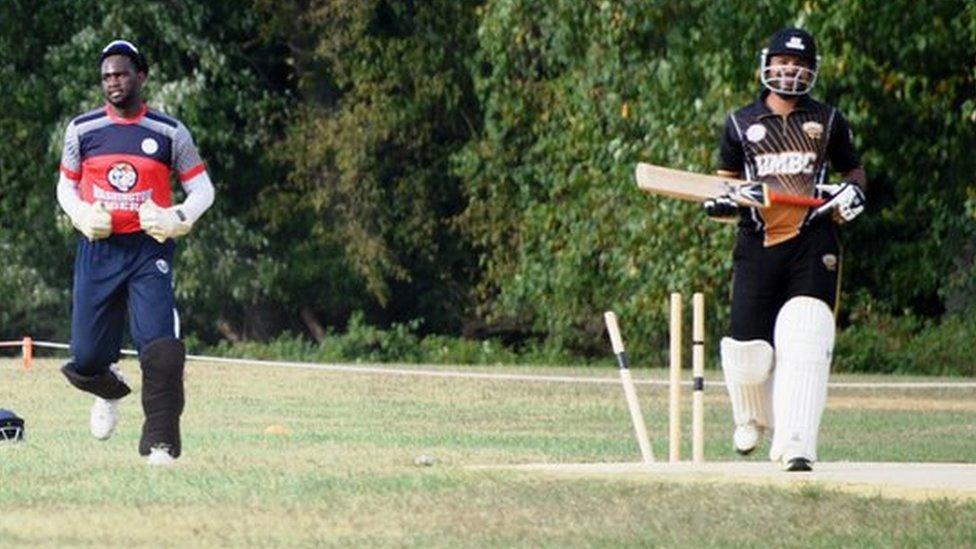Why more people are running marathons in all 50 US states
- Published
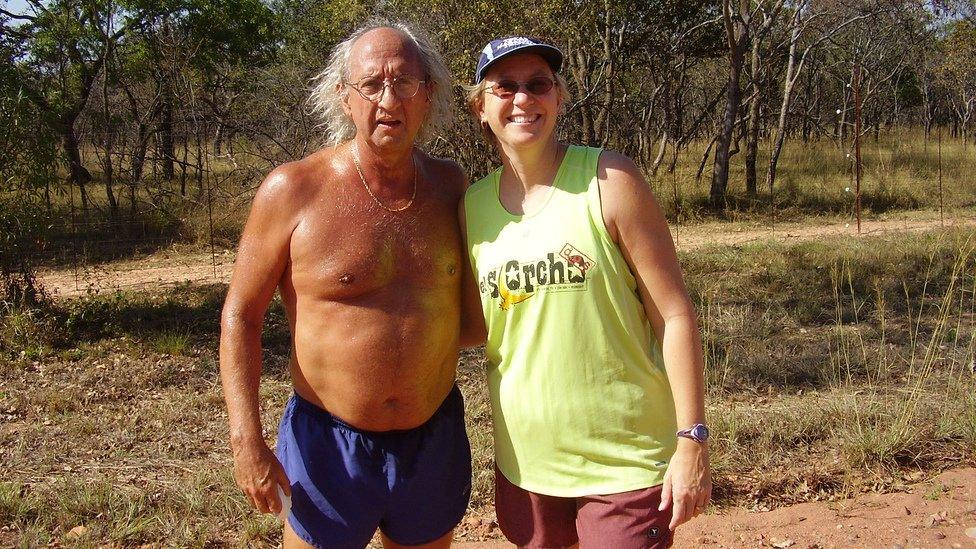
Steve and Paula Boone have run more than 1,000 marathons between them
Why are more people running marathons in all 50 states - and what does it say about modern America?
In 1988, Steve Boone was a computer systems designer who played football in his spare time.
One of his customers was training for the Houston Marathon. He bet Steve - a 39-year-old who had never run 26 miles - that he couldn't finish the race.
It's safe to say Steve won that bet.
He finished the 1988 Houston Marathon, and has returned to the race every year since. The 2018 event will be his 31st in a row, and his 700th marathon in total.
The only downside?
"It was a principle bet," says Steve. "No money at stake."
In 1997, Steve was at the Boston Marathon, waiting outside a hotel for a bus that didn't turn up.
By this point, he had run more than 100 marathons, including one in all 50 states. He had the idea after running in San Francisco. "It was one of those obsessions," he admits.
While waiting for the bus, he got talking to one of his fellow runners, Paula. "By the time we walked back to the hotel we were best friends," he says.
They were married 18 months later.
In 2001, the Boones decided to start a club for people who had run - or wanted to run - marathons in all 50 states, external. They began with 82 members; Steve thought they might get 400 or 500 total.
At the last count, there were 4,326 members. In total, more than 1,500 have finished all 50 states.
Of the finishers, more than a third are female, and almost all come from the US, although there are members from Brazil to Bermuda.
But the interesting thing isn't where they come from. It's why they run in the first place.

50 State Marathon Club: The rules (or some of them)
The event shall have a minimum of 10 finishers
It must have a minimum of 60 days' advanced publicity in a running publication, magazine, newspaper, website or race brochure
The event must either start or finish in the state being counted. A marathon that runs into two states counts as one

In 1997, Paula Boone was a marathon novice.
She ran her first, in her home state of Utah, a year earlier while "getting in shape after having my two kids". But after meeting Steve the pace picked up.
By 2003, she too had run a marathon in all 50 states. She now has 330 marathons in total, including at least four in each state.
"Steve was a really bad influence," she says.
Paula - who's 51 and lives with her husband in Humble, Texas - says she isn't an elite athlete. Her last marathon took seven hours, although she ran her first in three hours and 59 minutes.
So if she's not breaking records, or winning races, why does she keep going - step after step, state after state, more than 8,000 miles and counting?
"The actual running is really difficult," she says. "But I love to travel, that's my favourite thing to do. It's really the best way to see the country."
For example - one race took Paula to Minot, North Dakota, a town that's not in many travel brochures. "The middle of nowhere in the middle of nowhere," she says.
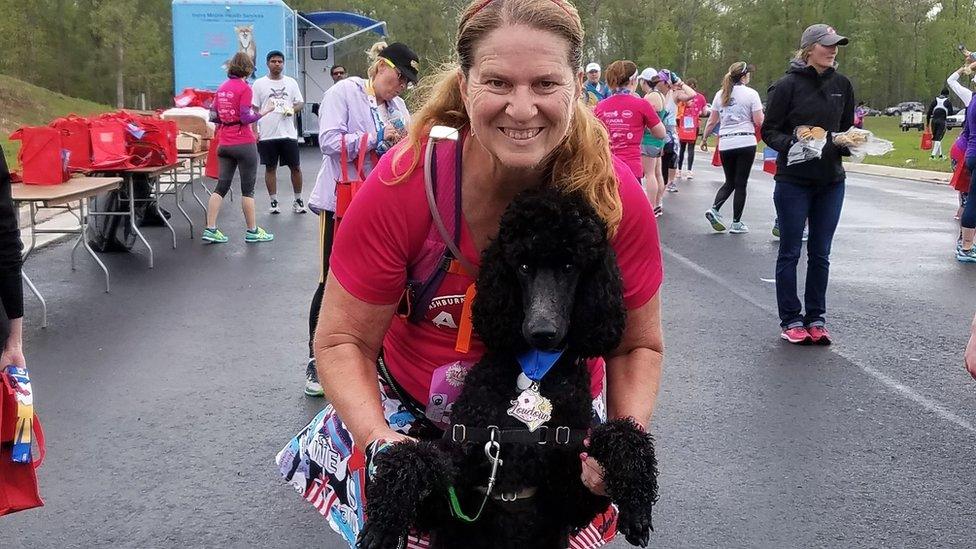
Jody Reed and her running partner, Sydney
There's also the social side. Jody Reed, a 58-year-old lawyer from Ashburn, Virginia, ran her first marathon in 1987 and has now done 152 - including at least one in every state.
"At this point, it's the friends [that keep me going]," she says, speaking from Milwaukee where she's about to run another race. "I'm here with a friend who I met last fall. We've done several races together since then.
"It would be a very unusual marathon where I'm not with people I know. And not just people I know - friends."
But while camaraderie is important, Paula thinks there's a deeper reason why people run.
"Most of us have pretty cushy jobs," she says. "We're not out there sweating, and as humans we like to have some sort of striving, some kind of drive.
"The marathon fulfils that. We want to work towards some kind of goal; [to have] some kind of stress and strain."
So running marathons is a counterforce to the comfort of modern life?
London Marathon: An inspirational end to the Marathon for two runners
"I think so," says Paula.
"The people who join our club are from every walk of life - people who are very poor, people who are very rich, and everything in between. The one thing that ties everybody together is they all strive. They are all self-driven.
"The mountains have all been climbed, everything has been discovered, but this is manageable - while being out of your comfort zone."
Ross Brennan, a 57-year-old from Washington, DC, ran his first marathon in 1990. Back then, he says, marathon running "was just becoming a thing - it was still a little bit exotic".
Now, marathons are certainly a thing. During the weekend of October 21-22, at least 26 cities in the US and Canada will host one according to marathonguide.com. There are 15 the weekend after and 24 the weekend after that.
There are a number of reasons for that, says Ross. More people keep fit; the internet makes it easier to find races; and technology has made running "less boring".
"You can nerd-out on the IT stuff," he says. "There are heart rate monitors, you can listen to tunes. In the 80s you couldn't do that."
And, like Paula, Ross thinks modern life makes marathons more appealing.
"From time to time, it's kind of primal," he says. "It's me and a pair of shoes, I'm not thinking about work, I'm not doing a PowerPoint presentation, and I've still got it.
"You can think 'my job sucks, I feel like crap, I'm getting old' but once in a while you show up and still do 26 goddamn miles."
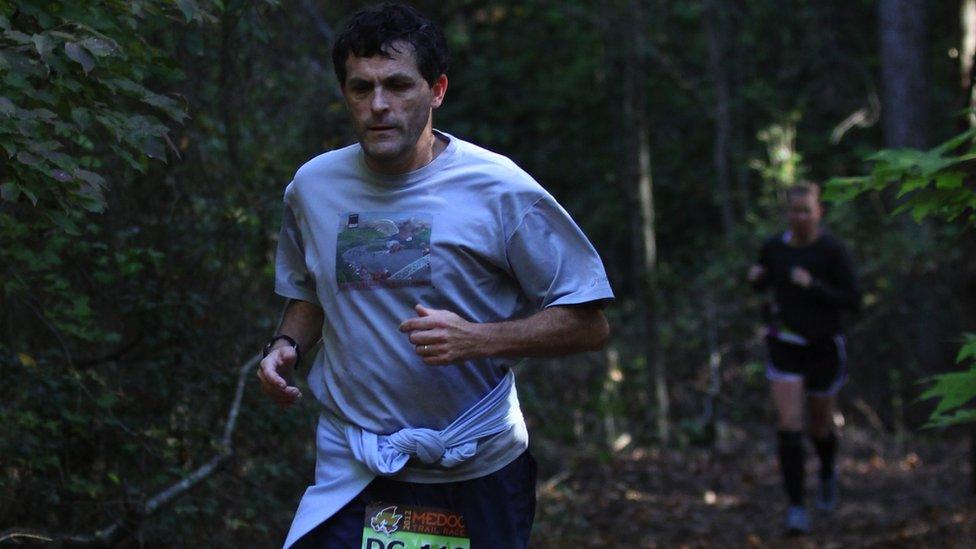
Ross Brennan: a self-confessed 'total geography nerd'
But - while that may explain running marathons - it doesn't explain doing one in every state.
"Oh, I'm a total geography nerd," admits Ross. "I love travelling in the US. It's so heart-warming to turn up in a small town. The whole place welcomes you and it's wonderful.
"There are banners, free ice creams at the ice cream parlour, a party in the city park... I need that reality check. It's so much part of why I do it."
At first, Ross didn't realise he was collecting states.
He ran on holiday. He ran during work trips. But it was only when looking at his spreadsheet - all runners have a spreadsheet, it seems - he noticed he was covering the country, slowly but sorely.
Ross was helped by the rise of "series marathons", when races are organised back-to-back over a week or so - often for people who want to complete all 50 states.
"The most I did was five in a week," he says. "It was the Riverboat Series - Kentucky, Tennessee, Mississippi, Louisiana, Arkansas, I think - four of which I hadn't done before."
Ross told his wife he wanted to run in 50 states only three years ago. "I did it in quite a subtle way," he says. "It was like: 'Here's this thing I'm doing...'"
But when he flew to Hawaii to complete the set, his family came to watch him cross the line.
The date was 26 June 2016; his time was just under five hours. A journey that began 26 years earlier, 5,000 miles east, had ended.
He has now run 71 marathons and there are no plans to stop. "Even if I'm not planning to run, I'll log onto Marathon Guide and see what's out there."
While that may be "eccentric", as Ross says, it's nothing compared to some members of the 50 State Marathons Club.
"I remember being on a shuttle bus in a race in Montana, or somewhere," says Ross. "This guy said to me 'It's number 11.'
"I said 'Cool - are you going to do all 50 states?' He replied 'No - I've done all 50 states. This is the 11th time round.'"
- Attribution
- Published23 April 2017
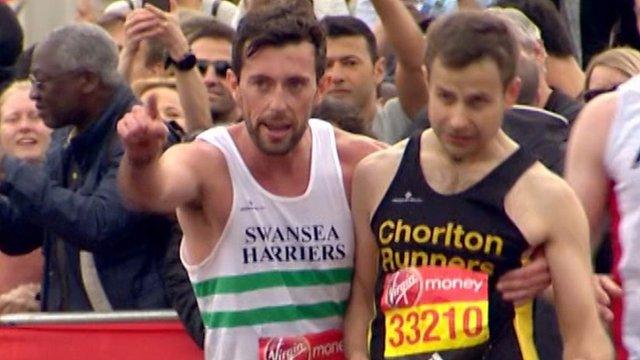
- Published9 October 2017
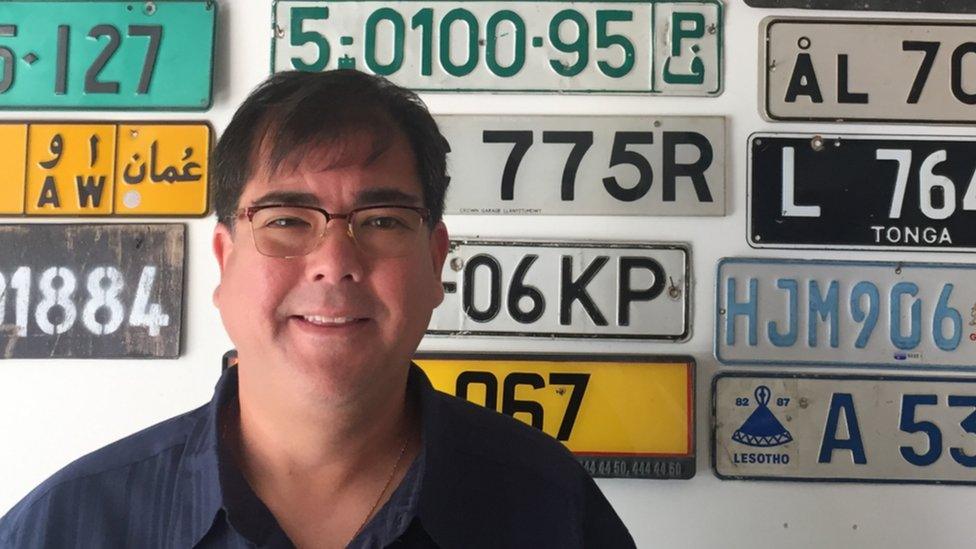
- Published14 October 2017
